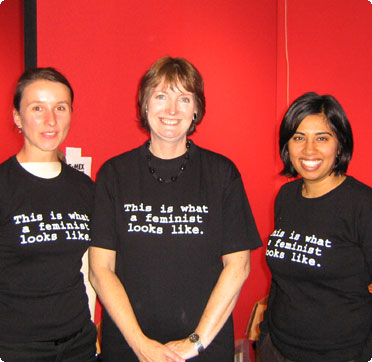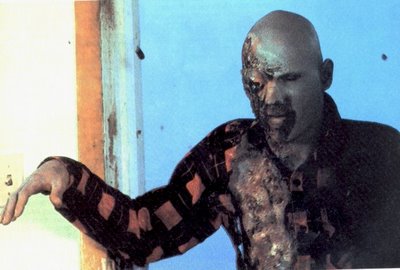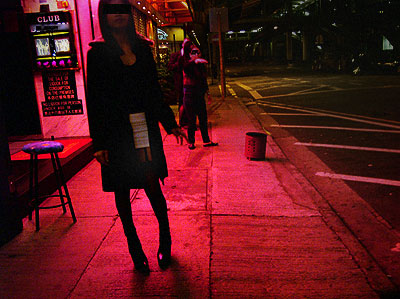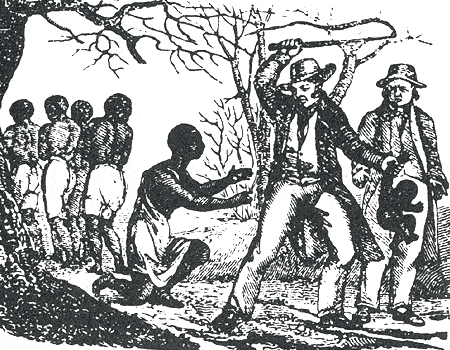 It is however still undoubtedly New Labour that holds the undisputed record for its gross and continuing addiction to unnecessary and illogical illiberalism.
It is however still undoubtedly New Labour that holds the undisputed record for its gross and continuing addiction to unnecessary and illogical illiberalism.
So it continues to be on the intractable problem of prostitution. It wasn't so long back that the party was considering the idea of "red light zones", where prostitution would be tolerated and potentially supervised to make it less likely that sex workers would be abused, and the setting-up of "mini-brothels", where 2 or 3 women could work together and protect each other, all ideas which have now been most certainly dropped. The latter was the work of Fiona MacTaggart, who while distinctly opposed to prostitution and who wanted tougher penalties for kerb-crawlers accepted that there was no possible way the government could stamp it out, and also accepted that making the buying of sex illegal would achieve nothing in the long run except making those dependent on selling their bodies even more vulnerable and desperate. She may since have changed her views, and did previously suggest an amendment which would make buying sex illegal.
MacTaggart has since the left the government, and policy on prostitution has increasingly come under the influence of the Harriet Harman, who has made quite clear that she is much inclined towards just the policy which MacTaggart opposed. Like with all the politicians and campaigners down the ages, whether complaining about video nasties, declining moral standards or otherwise, few want to be seen as stopping adults from choosing their pursuits as they see fit. Instead, there has to either be someone or something that is being affected by the pursuit the adult chooses which can instead be used as the justification to stop it in its entirety. With video nasties it was that children were watching them and being either disturbed or corrupted by their contents. With drugs it's that they're either getting more powerful, that the side effects are increasing or that the working classes and less educated can't handle them. With prostitution they now seem to have finally found a reason why the buying of sex should be made illegal: trafficking and the resulting sex slavery.
Harman is using this exact argument and has even had an opinion poll commissioned to help back her up. It unsurprisingly found that more than half of both men and women were in favour of making buying sex illegal if it would help reduce people-trafficking. It does also though, contradictingly, show that both men and women still think that buying sex should be made completely legal, something that Harman strangely didn't emphasise. The obvious problem with this is that there is absolutely no evidence whatsoever that making the purchasing of sex illegal would help to decrease it; while there is some evidence which points towards the complete legalisation of prostitution increasing sex trafficking in countries where that has happened, the held-up example of Sweden offers no real definitive evidence that it has helped stem the trade. The most it suggests is that prostitution in Stockholm fell after buying sex was made illegal, which proves little as it may well just have been that prostitution had increased outside of the capital and pushed it further underground, with those practising less easy to come across.
Similarly, we also don't know just how big a problem sex trafficking actually is. While politicians have adopted the stance of making it illegal to stem this "modern-day evil of slavery", the first police operation designed to combat it, called Operation Pentameter, rescued a compartively tiny number of 88 individuals. Its follow-up, Pentameter 2, rescued a further 167. The police themselves claim that they think up to 18,000 trafficking victims might be being forced to work as prostitutes. If so, that shows that the attempts to combat it have been a miserable failure. If in fact those estimates are wildly excessive, which seems a much more reasonable assumption, then it suggests that the problem is being wildly overstated, and that it's being used a tool by those ideologically opposed to prostitution to outlaw something which they detest for moral reasons.
Harman's poll was further commissioned to come alongside a report by the Eaves charity, which runs the Poppy project. A follow up to their 2004 Sex and the City report, Big Brothel (PDF) is meant to present a realistic picture of the scale of prostitution in London. To say the entire project is incredibly biased towards prohibition would be an understatement: it calls former prostitutes who gave evidence "survivors", and in the press release (PDF) the co-author, Helen Atkins, has this to say:
It has been said that we are never more than six feet away from a rat in London. Apparently, something similar applies to brothels, places where thousands of women are regularly exploited by men who buy sex.
Instantly then we are presented with the conclusion that women are being exploited by men who buy sex. That this is far from proven, or indeed provable is no issue to either Atkins or Harman. For all the attempts of both to present the report as shocking, it in fact hardly tells you anything that most with more than a passing knowledge of the sex industry know already: that the number of different nationalities involved reflects the multicultural nature of London more than it does the idea that foreign nationals are increasingly being trafficked; that the price of penetrative sex fluctuates wildly from as little as £15 to £250; that sex without a condom costs roughly double that of protected sex; and that most premises are in residential areas with a discreet appearance. Indeed, it tries to have it both ways; prostitutes selling sex on the streets are undoubtedly in the most potential danger, yet the report suggests increasingly that off-street sex is becoming the norm, which ought to be a cause for celebration, that perhaps even without legalisation sex workers are getting together and working indoors in order to be safer. Street prostitutes are also most often those that can't work in brothels because of their drug habits; if they're becoming rarer, it perhaps brings encouragement that drug abuse and dependence is becoming less of a signifier of sex workers.
The report is aimed at taking on misconceptions, such as those arising from glamorous and unrealistic productions like Secret Diary of a Call Girl. It goes without saying that such programmes are ludicrous, and provide only a picture of the very highest realms of escort work. The reality of prostitution can be seen in almost any genuinely pornographic work, where it's more than apparent that sex is one of the least arousing activities around; there is very little that is less erotic than the idea of a woman having sex with 20 different men potentially in a day, of the pain, numbness and withdrawal from real life that has to be taken on board for such a person to survive and live from day to day.
It is however equally dangerous and also completely wrong to assume that an overwhelming majority of those involved in prostitution do not choose it, especially those from abroad, which estimates suggest now make up 80% of those in sex work. For those with families back home, it provides more money than any menial labour job will ever do, and it's one that some indeed choose to do without any coercion. The report tries to challenge the idea of this as a myth, but it fails miserably:
“Women choose prostitution.” It is a choice through lack of choice. A significant number of women involved in street prostitution were groomed as children. Many enter through marginalisation, dependencies and/or economic necessity.
But here the report is trying to have its cake and eat it. This is after all a report on prostitution within brothels, not on the streets; most street prostitutes as we have already mentioned are indeed the most vulnerable who can't work in the premises which the report is investigating. They would have undoubtedly benefited from teaming up in the way that MacTaggart proposed, or through the red light zones, but both have been dropped and are doubtless opposed by those behind this report. It sets up other straw men and then knocks them down, such as the following:
“Anti-prostitution feminists are against women in prostitution.” One of the more convincing lies coming from the pro-sex work lobby is that feminists who define prostitution as ‘abuse’ are against the women themselves. Abolitionists are supportive of women in the sex industry, but against the institution of prostitution (e.g. FCAP, 2008).
Who here after all is in denial? Those who genuinely believe that prostitution can be abolished and that define all prostituition instantly as abuse or those that realise that most feminists are unwilling to accept that those involved in pornography or prostitution are doing it out of free choice or even because they personally find it empowering? After all, it also tries to claim it's a myth that women can also exploit men as much as the men can also exploit the women; it's undoubtedly the case that prostitutes are abused, both physically and sexually whilst selling themselves but those who favour making buying sex illegal will only make this more likely and less actionable by pushing the trade further underground.
It's this that makes the stance of the government so infuriating. Full legalisation is not on the agenda, and considering the potential pitfalls of it, it's probably not anything approaching a solution in the first place. Likewise though, criminalisation of those who buy sex penalises not just the men that are not instantly exploiting the women through their lack of ability to either get into proper relationships, or those that buy it whilst married or in relationships, but also the prostitutes themselves that do choose to work in the industry and would like further protection rather than lectures from women that refuse to openly state their opposition to prostitution as a whole and hide behind the exploited in order to do so. Sex is never going to be something most are going to be able to take openly about, let alone the buying of it, but the hiding behind others, something this government has done repeatedly to quash ancient liberties, is not just politically and morally bankrupt, it's also downright cowardly.Labels: authoritarianism, Big Brothel, Eaves, Harriet Harman, illiberalism, New Labour, policy, Poppy project, prostitution






